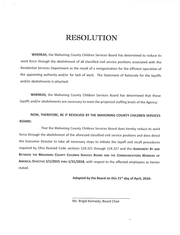Last Mahoning County Children Services group home will close
TweetYOUNGSTOWN
Group Home Closing
Resolution document regarding the reduction of work force.
Consistent with a state and national trend away from institutional residential settings, the Mahoning County Children Services Board will close its last group home this year and abolish the jobs of 24 workers there.
The board voted to take that action Thursday after an executive session with the county commissioners and its own executive session concerning the contract issues posed by the change.
In its resolution to close its Glenwood Avenue group home and abolish the jobs, the board directed Randall Muth, its executive director, “to take all necessary steps to initiate the layoff and recall procedures” required by state law and its labor contract with Communications Workers of America Local 4300.
“We are transitioning away from that [group home] level of care toward family foster homes,” Muth explained. “That group-home level of congregate care is an outdated way of responding to these kids.”
The displaced jobs range from a $43,763-a-year group- home coordinator with 30 years of service to seven $14,352-a-year part-time youth leaders with one to five years of service.
Displaced workers could be absorbed into other Children Services jobs, Muth said.
He said, however, he does not believe the displaced workers will have any seniority-based transfer rights to other CSB jobs because all group-home-related job classifications are being abolished.
Any disagreements between the union and management concerning the issue may be resolved by the state or an arbitrator, Muth said.
Patrick Carlini, union president, declined to comment.
The agency’s objective “is to significantly reduce its reliance on publicly-run residential services,... safely reduce congregate-care placements and improve outcomes for all of the children in its custody,” the board said in the statement of rationale accompanying its resolution.
“That is really the best practice for child welfare. It is the most-efficient use of the public dollars, and, ultimately, it is what is in the best interests of our children,” said Brigid Kennedy, CSB chairwoman.
“We’re going to use the money that we save [from the group-home closing] to reinvest in other more effective ways of servicing these kids,” including increasing case intake and early-intervention services, Muth said.
Eight teenagers are housed in the Glenwood Avenue group home that will close. That home is owned by Steel Valley Homes for Youth.
When that group home closes, “We’ll either look for relatives that can take one of the children, or we’re going to look for family foster homes,” to house the displaced group-home residents, Muth said.
A Broadway CSB group home on the North Side owned by the Swanston Trust has been closed since it incurred water damage due to sprinkler activation during a March 8 fire.
A Midlothian Boulevard CSB group home on the South Side closed in 2011.
After Mahoning County Children Services gets out of the group-home business, the only remaining Ohio counties providing county-run children’s homes will be Trumbull, Lake, Jefferson and Adams counties.
“By the mid-1970s, most Ohio counties had closed their children’s homes in preference of foster homes,” the board said in its rationale statement. Ohio has 88 counties.
Muth said the additional $2.1 million a year the voters approved for Mahoning CSB operations in the November 2014 levy is essential to fund the safe transition from institutional care to more family-like alternatives.
The board statement, however, said getting out of the county-operated group home business could save CSB $11.2 million over the next 10 years “and may result in a reserve balance of $3,915,592,” after 10 years.
The board said it studied making the transition to less-restrictive care two years ago, but decided its only option under the financial constraints it faced then would have been group-home privatization, which it believed would have been “a step backward.”
 43
43




Subscribe Today
Sign up for our email newsletter to receive daily news.
Want more? Click here to subscribe to either the Print or Digital Editions.